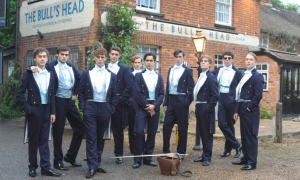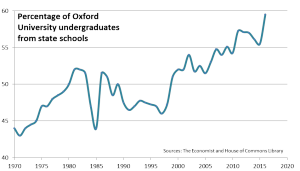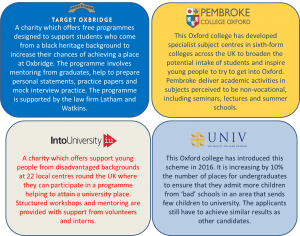
You must have seen pictures of the Bullingdon Club? If not, have a look at the picture over there. You know, the clique of elite and wealthy students at Oxford, ex-Etonians and the like, who meet in their tailcoats for grand banquets before trashing the restaurant under the chant of Buller, Buller, Buller Worry not, Pater will pick up the bill.
Well, those days are fast coming to an end as Oxford and Cambridge come under increasing pressure to take on more state school kids, kids whose dad doesnt pick up the bill for the damage, nor the tuition fees. Although Oxford and Cambridge have done a sterling job in increasing the representation of undergraduates from state schools over recent years (see graphic) to around 60% (Cambridge has 62%, Oxford 59%),

this is still disproportionately low compared to the 93% who go to state schools across the UK.
Interestingly though Oxbridge are caught in a trap.

There is a detrimental outcome on these renowned universities as they are slipping down the global league tables because they are distracted by pressure to focus on admissions diversity rather than quality of research. Over the long term this could have an eroding effect on the Oxbridge brand. (http://bit.ly/24rKZL5 ) That sweet city with her Dreaming Spires

is a global brand these days and, like the FTSE 100 constituents and Premier League football clubs, its focus should be on the international playing fields. Consequently, the wealthy Brits are being squeezed out by quest for diversity and the international competition. A by-product of the knock-on effects of all this is that the extremely confident, well-connected private and public schoolies with excellent grades, modern day Bullingdon members, are displaced and dispersed to other universities thereby changing the make-up and standards of the recipient establishments. Then there is ripple across the rest of the academic pond. Ironically they are being replaced at Oxbridge by people from similar backgrounds who nowadays go to the top state schools. Not quite the diversity intended.
One of the issues historically is that very bright children from poorer areas do not believe they are worthy of going to the very elite universities and opt for an easier option where they are more likely to fit in and images of the Bullingdon Club do not help matters. As well as fewer applicants from poorer areas whose school might not be used to dealing with the entrance procedures, compounding this, fewer of those who do apply actually achieve a place. Word gets back about the mauling at interview and no-one ventures forth again.
Some help is on its way however ( http://econ.st/2gk1SzZ ). There are a number of admirable organisations which have been set up to concentrate on helping students from underprivileged or minority backgrounds to enter Oxbridge. Examples include Target Oxbridge, which does what it says on the tin, then theres Into University which has a wider remit than just Oxbridge. There has been an interesting trend for individual colleges, such as Pembroke and University in Oxford, to forge links with local schools and communities around the country.

All this is positive but its slow-burn, for example, since Target Oxbridges launch in 2012, 30 people have successfully made the transition. At Kloodle we believe the real problem with getting into Oxbridge for students from underprivileged backgrounds is the admissions procedure. It involves a process misaligned with the norm; early UCAS application, extra exams, a rigorous interview if youre lucky. It is shrouded in mystery and opaque from the outside. It used to favour public and private schools, which have traditional links with colleges and host teachers who went to Oxbridge colleges and understand the process. Since the governmental push for more state school places, public and private school pupils have been replaced by students from an increasing, but small, number of high octane elite selective state sixth forms in wealthy areas, mainly in the South East of England, which have become feeders for Oxbridge colleges. ( http://ind.pn/2aWZiNm ) This leaves vast areas of the country, home to some very bright young people, with little or no Oxbridge representation.
The students from poorer backgrounds have access to limited advice, so, for example, they usually aim for a place in core disciplines, such as medicine, but this is incredibly competitive. They also they have little opportunity to practise past exam papers and interviews, unlike their public school peers and they have few role models, pupils a year above them who achieved a place. Then the whole interview process is intimidating; the intensity, expectations and qualifications of the interviewer, the way you are expected to behave and so on. We spoke to a group of unsuccessful candidates from colleges near Manchester

and they complained that the interviewers spoke a different language; they felt it wasnt the place for them. Samina Khan, Head of Admissions at Oxford, says that schools should identify potential Oxbridge candidates in Year 7 and then coach them for years ahead of application. This is much less likely to happen at some state schools and for late developers. Surely its about potential.
At Kloodle we have set up an Aspiring to Oxbridge Group, which is a forum where students from around the country can interact about how best to approach their Oxbridge application. They hail from a diverse range of backgrounds but are very smart and have amazing Kloodle profiles. Mentors who are current undergraduates are invited to communicate with the aspirants to give insight into what is expected and required. This scheme has received great feedback and we intend to expand the mentor population to working graduates.
Oxford and Cambridge still have a lot of work to do if they are going to broaden their appeal. Meanwhile, the prospective Bullingdon Club members will probably decamp to Bristol. Hurrah!
